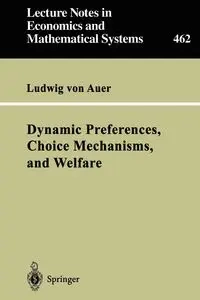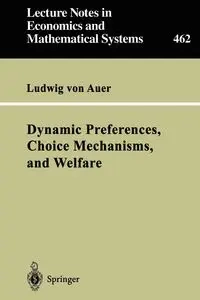Dynamic Preferences, Choice Mechanisms, and Welfare - von Auer Ludwig
Dynamic Preferences, Choice Mechanisms, and Welfare - von Auer Ludwig
Autorzyvon Auer Ludwig
EAN: 9783540643203
Marka
Symbol
813HJW03527KS
Rok wydania
1998
Strony
244
Oprawa
Miekka
Format
15.6x23.4cm
Język
angielski

Bez ryzyka
14 dni na łatwy zwrot

Szeroki asortyment
ponad milion pozycji

Niskie ceny i rabaty
nawet do 50% każdego dnia
Niepotwierdzona zakupem
Ocena: /5
Marka
Symbol
813HJW03527KS
Kod producenta
9783540643203
Rok wydania
1998
Strony
244
Oprawa
Miekka
Format
15.6x23.4cm
Język
angielski
Autorzy
von Auer Ludwig

For most economic aspects of human behaviour, static deci sion models provide an insufficient description. More specifically, they ignore the fact that preferences may change over time and that at each point of time
current preferences depend on aspects which are associated with the past or the future. The neglect of these phenomena may lead to results which have little in com mon with real life. Dynamic decision models were developed in
order to cope with these complications. Spurred by the availability of new mathematical tools such as optimal control theory and dynamic programming, dynamic utility models mushroomed over the last two decades. Various
frameworks were developed featuring dif ferent restrictions on the way agents form preferences in an in tertemporal environment. Unfortunately, no systematic reappraisal of this literature ex ists. The survey provided in
part I of this thesis attempts to fill in this gap. It introduces a comprehensive classification sys tem which allows for a coherent organization of all studies of intertemporal choice under certainty and complete
information. 2 1. Introduction The latter implies that the individual knows in advance all fu ture preferences and choice possibilities. In this survey we show that all dynamic utility models can be viewed as special cases of
the class of universal utility mod els. It is therefore desirable to investigate intertemporal decision making in terms of this least restrictive framework. Accordingly, all findings of part II of this thesis are derived for
the class of universal utility models.
EAN: 9783540643203
EAN: 9783540643203
Niepotwierdzona zakupem
Ocena: /5
Zapytaj o produkt
Niepotwierdzona zakupem
Ocena: /5
Napisz swoją opinię

